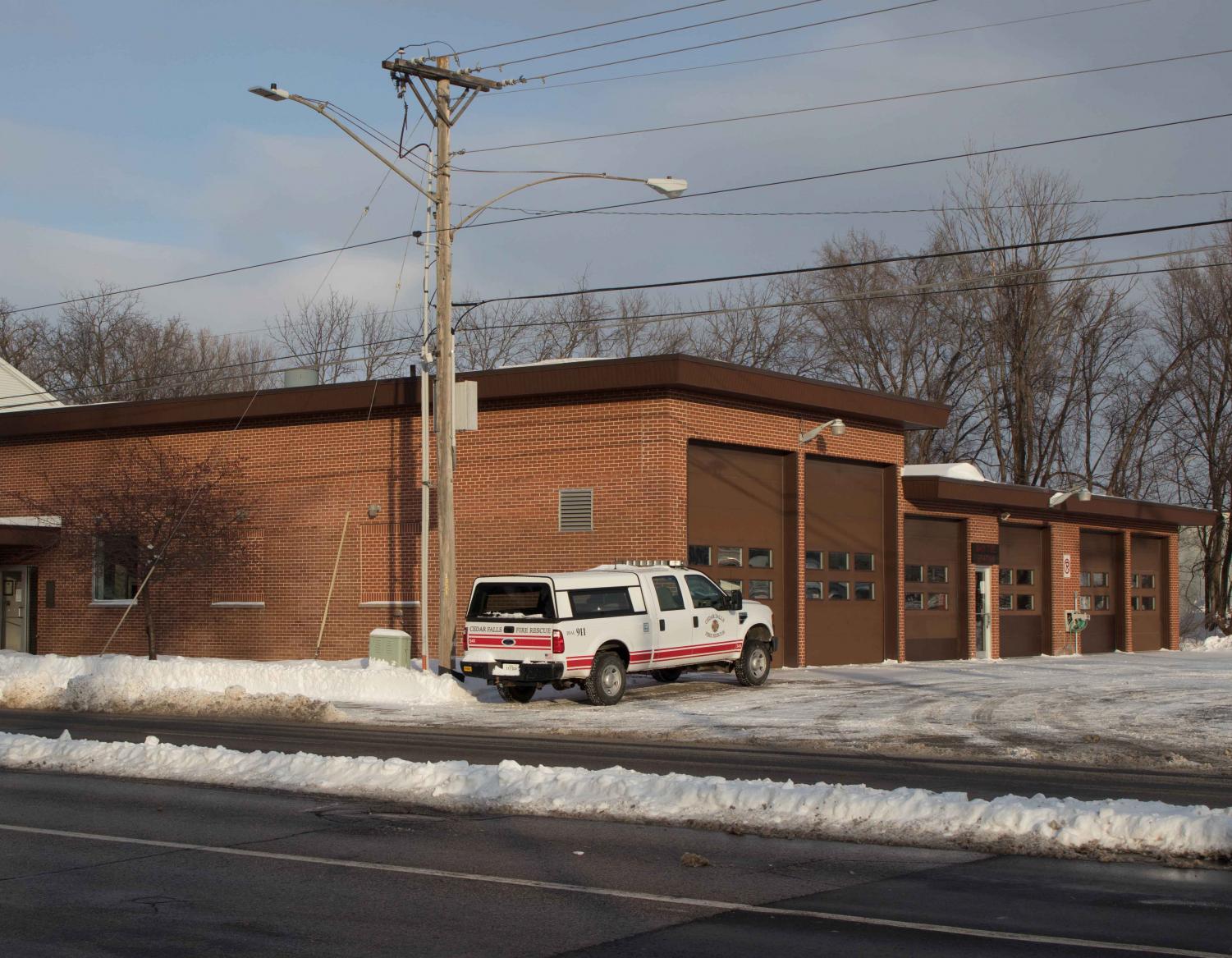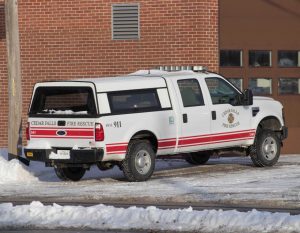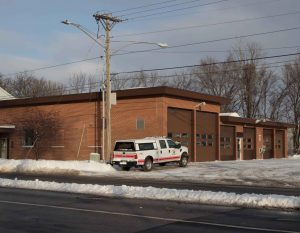PSO program divides community
Jan 31, 2019
Seven full-time Cedar Falls firefighters, including the 2017 Cedar Falls Firefighter of the Year, have resigned since September of 2018. Citing reasons such as a hostile work environment and safety concerns, these departures have chiefly been in response to Cedar Falls’ Public Safety Officer (PSO) program.
In 2015, the city of Cedar Falls implemented a paid on-call program that provided cross-training to staff from various civic departments, enabling them to provide support to police and fire safety efforts as needed.
According to a guest essay published in the Waterloo-Cedar Falls Courier by City Councilmen Frank Darrah and Mark Miller, this initiative “energized staff and generated a sense of teamwork among city staff across departments.”
They cited an investigation by local public safety leadership into similarly integrated staffing solutions used by other police and fire departments nationwide. Miller and Darrah stated in their joint essay that they found “extremely positive example(s) of the PSO model” and other “creative ‘hybrid’ models” throughout the country.
In 2015, the city council endorsed the implementation of a PSO program in Cedar Falls.
While the local police union agreed to participate, the firefighters’ union, Cedar Falls Firefighter’s Local #1366, turned it down. In the years following, the program’s application has become a divisive issue among civil servants and fire crews, with the community starting to take notice.
“Firefighters hold a special place in my heart, as I have a history of firefighting in my family,” explained Annemarie Goldhorn, a graduate student in social work. “My grandfather and uncle were both career firefighters and my dad served as a volunteer firefighter my entire childhood. I remember the level of training that was needed to keep our community safe. It is because of this knowledge what is happening in Cedar Falls is worrisome and scary to me.”
Proponents of the PSO model argue that this system allows more personnel to respond to emergencies than ever before, at lower operating costs for the city. In the Public Safety Services’ recent “Accomplishments and Goals” report, the first accomplishment listed reads: “The number of public safety officers (PSOs) reached over 30 in 2018. This number combined with the full-time firefighters means over 60 available for calls… We have had many instances of 14 or more trained firefighters responding immediately to the scene and more upon callbacks. This has never happened before in the history of the Fire Department.”
However, a pinned post from Nov. 2, 2018, on Cedar Falls Firefighter’s Local #1366’s Facebook page shows a different side to the story. It features a video captioned, “No matter how many people Mayor and City Council say we have trained as PSOs, it doesn’t matter if they don’t show up for a fire or other emergency.”
The video shows understaffed firefighters, unable to enter the raging flames without enough support, repeatedly asking when the PSOs will come help. Without enough emergency response and uncertainty as to where the PSO staff even is, the house is shown at the end having burnt to the ground with the words, “Where were the PSOs?”
Over the past five months, seven full-time firefighters have left their positions in Cedar Falls to seek full-time employment elsewhere. Many have cited safety concerns with PSO staff taking on the dangerous task of fighting fires. Within a week of 2017 Cedar Falls Firefighter of the Year Dusty Stotler leaving the force, former Cedar Falls firefighter Jeff Haler expressed his and his former disgruntled colleagues’ views in a public resignation from the department.
“Firefighting requires training and dedication, and I do not think the PSO’s can commit enough to be highly trained firefighters,” Haler wrote. “I believe the attitude of the city towards the dedicated firefighters has deteriorated. I also feel that the city does not care if any are firefighters are injured, or heaven forbid, killed in the line of duty… Due to the hostile work environment, the firefighters are forced to endure; it is becoming too stressful in an already stressful job.” Haler’s last day was on Jan. 18. He had been with the Cedar Falls fire and rescue since 1999.
The Fall 2018 edition of the City of Cedar Falls’ quarterly newsletter, “Currents,” defends the PSO model. It describes Cedar Falls’ 21 PSOs as having “assumed their rightful positions as fully cross-trained firefighter police officers.”
The newsletter condemns the criticism of the model by fire union representatives, stating that “their elitist attitude is insulting.” “Currents” also informs that 18 more PSOs will be joining the force in early 2019, eight of whom were already sworn in at the city council meeting on Monday, Jan. 7.
City council meetings have recently served as a sounding board for the public’s opinions on the issue. “Stand Up for Safety, Cedar Falls” is a local group in opposition to the PSO model, whose Facebook page boasts over 1,600 likes. In response to Currents’ praise of PSOs, criticism of full-time firefighters’ costs to the city, and claims that the staffing changes are delivering “greater safety, far more efficiency and needed economy,” the group organized a turnout of over 150 people to the council’s Nov. 5, 2018 meeting. Twenty-one people spoke out about their differing views on the program, including Mark Woolbright, vice president of the International Association of Firefighters. He flew in from Washington, D.C. for the meeting and called the PSO program a “flawed and dangerous experiment,” according to the Waterloo-Cedar Falls Courier.
Sharon Regenold, a local retired firefighter, had previously written to Mayor Jim Brown requesting the city hold a public forum about the issue, to which Brown responded, “I will not have a meeting where my staff is barraged by people who are trying to separate the community.” At this Nov. 5 meeting, Regenold had the opportunity to address Brown’s refusal, stating, “This leads us to believe you are not open to hearing from both sides. If you’ve already decided how this will end, you are not listening to your citizens.”
The recent edition of “Currents” estimates that a full-time firefighter costs the city $108,439.25 annually while only working just under eight days a month. The newsletter also explains that sick leave among full-time firefighters is at an all-time high, causing these shifts to be covered by others at an overtime rate, approximately $1,000 – $1,200 per person, per shift. Currents argues that increasing PSO numbers will cut costs by reducing the need for overtime pay when other police, firefighters or PSOs are out sick.
Opponents say that the city is doing so at the cost of public safety and the existing firefighter staff. “Stand Up for Safety, Cedar Falls” is rallying support through signs, shirts and stickers promoting their call for the city to hire more full-time firefighters instead of expanding the PSO program.
Goldhorn said, “This is an issue that not only impacts the city of Cedar Falls; it impacts students, staff and visitors to UNI. If we were to have a significant fire on campus, we do not have a fully staffed fire department to respond to the call. The University has the potential for some very unique situations that would require specialized training for those responding if a fire or steam emergency ever happened. The biology, chemistry, art department, steam tunnels, the height and size of the buildings and the limited access all bring about special circumstances that a typical house or business in the community does not.”
She went on to say that the College Hill district is especially integral to the UNI experience, and incidents like the shooting early this New Years’ Day this year, the fire that burned down Great Wall restaurant in 2016 and other safety concerns bring this community-wide issue home for the UNI population.
“Remember when there was the shooting murder near campus a year ago?” Goldhorn continued. “Cedar Falls police officers responded to the call and were looking for the suspect when a call came in for a fire. The police officers who are cross-trained as PSOs had to leave the scene to respond to the fire.”
When asked what would be the best solution to the issue, Cedar Falls Firefighter’s Local #1366 President Scott Dix replied, “An all-new city council and a new mayor.” He went on to explain that his ideal end would entail an end to the integration of the police and fire departments, with the fire departments regaining control over their own operations, personnel and purchasing, and the abolition of the public safety officer program.
The City Council meets on the first and third Monday of each month at 7 p.m. in the Cedar Falls City Hall Council Chambers at 220 Clay Street. Citizens have the opportunity to address the council during the open forum portion of each meeting.



















Lori L. Dove • Feb 2, 2019 at 4:54 pm
Listen to the professionals–the firefighters. Listen to your constituents. Be sure to vote in the next elections.
Susan Petersen • Feb 2, 2019 at 12:21 pm
Sorry to say but it’s going to take an outright catastrophe to get the attention of the businesses, college and general public involved…what this mayor, City Council, Public Safety Officer, Olsen and Fire Chief Bostick have done to this city’s safety is an outright travesty. Complete disregard for the fire department as a whole. The stress level on those dedicated firefighters has to be astronomical..for most this career path is a calling and to have a chief turn his back on his men is truly shameful….no confidence vote for him, get the national union involved in a lawsuit against the city and call for a state audit to show where the $$ is going for fire safety, etc. This doesn’t take into account all the aging populations in the Western Home Communities, etc. But most of all get the message out to ALL about the dangers so that these inept policy makers can be VOTED OUT!